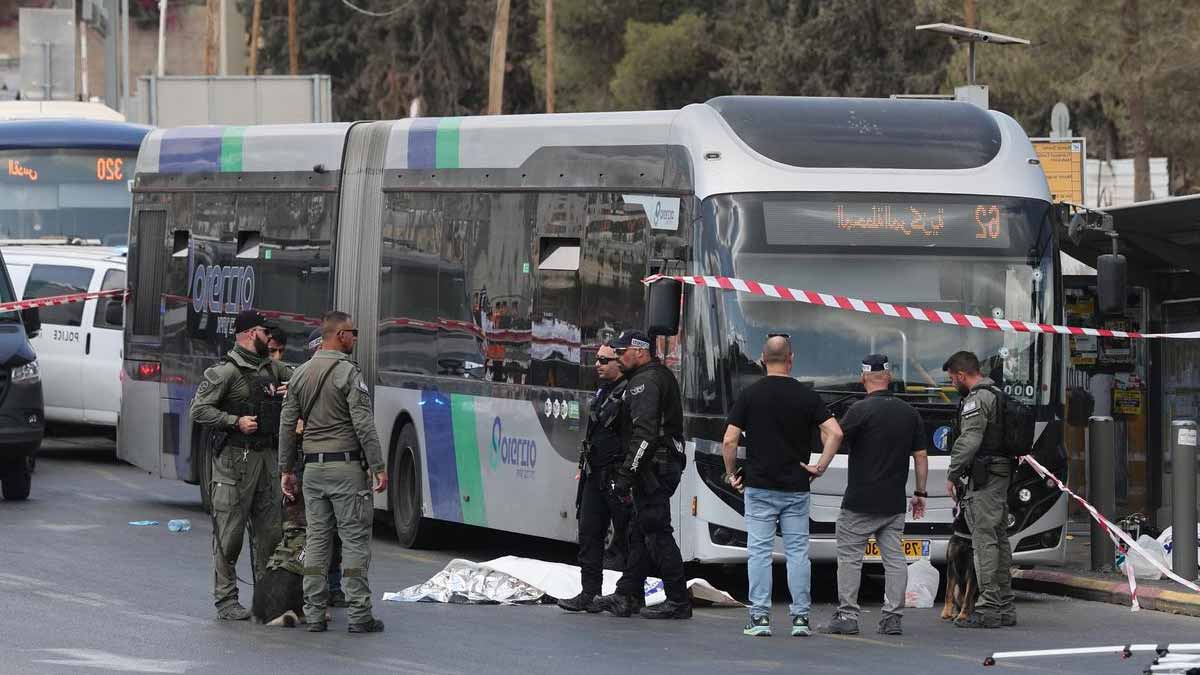The morning in Jerusalem was shattered by sudden violence, leaving the city stunned and searching for answers. At least six people were killed in an attack that unfolded without warning, turning an ordinary day into one marked by grief. The incident now casts a long shadow—over streets and families as well as official corridors—raising questions that reach far beyond the scene itself.
How the Morning Happened at Ramot Junction
Witnesses said two attackers drove to the bus stop and opened fire on people waiting there. A security guard and a bystander returned fire, killing the gunmen at the scene. Traffic stopped, phones lit up, and medics rushed in. The immediate danger ended quickly, but the physical and emotional toll was already severe.
Hours later, emergency teams confirmed multiple deaths and injuries. Investigators began tracing the attackers’ movements and origin. Ramot Junction is busy on most workdays, so the rapid response mattered. Ambulances cleared casualties, police cordoned off the area, and teams sifted through shell casings, broken glass, and eyewitness accounts to piece together the sequence of events.
By late morning, authorities focused on restoring calm. Patrols increased citywide, with visible presence at bus stops and train stations. Roadblocks went up, loudspeakers and phone alerts guided commuters, and investigators secured evidence while officials tried to steady routines shaken by the Jerusalem attack.
Global Responses as Jerusalem Attack Shakes a City
Condolences arrived quickly from abroad. European officials condemned the shooting and called for calm as grief deepened. Spain reported one of the victims was Spanish and pledged support for the family—echoing other European statements that emphasized protecting civilians and acknowledged how shaken Jerusalem felt.
Inside Israel, leaders visited the site. Court schedules shifted, and the prime minister canceled a planned appearance to travel to the junction. Social media filled with footage of ambulances, stretchers, and shattered glass. In a city accustomed to sirens, the images struck hard precisely because the attack hit an ordinary bus stop—reminding many how sudden danger can be.
Political rhetoric also intensified. A far-right minister said the Palestinian Authority should be “removed from the map,” despite no evidence linking the suspects to the PA. The remark drew swift criticism and warnings from abroad that such language could inflame tensions while families were still identifying loved ones.
What Authorities Know and What’s Still Unclear
Police named the shooters as Muthanna Omar, 20, from Al-Qubeiba, and Muhammad Taha, 21, from Qatanna, villages northwest of Jerusalem. A joint statement from Israel Police and the Shin Bet said neither had prior arrests. Both were killed at the scene after firing on the bus stop. The investigation is ongoing.
Detectives also arrested a suspect from East Jerusalem and broadened searches for anyone who may have helped with planning, transport, or weapons. Teams are reviewing security footage, timelines, phone records, and traffic cameras around the junction. Officials noted that early accounts can change as new evidence emerges and kept updates cautious while pursuing leads.
Hamas did not claim responsibility but publicly welcomed the shooting—an element that can shape both police tactics and political fallout. For residents, though, the Jerusalem attack feels personal long before it becomes policy or headline.
Security Measures and Regional Spillover After the Jerusalem Attack
As the city absorbed the shock, the Israeli military issued new evacuation orders in Gaza City, warning that certain tall buildings could be targeted due to alleged militant infrastructure in or near them. One named site housed the Palestinian Centre for Human Rights alongside media and clinics, in a neighborhood already scarred by earlier strikes.
The defense minister vowed a “massive hurricane” of air operations unless hostages were released and weapons laid down—a message that spread widely online and signaled potential escalation even as Jerusalem mourned. Residents looked for immediate signs of safety—especially on buses and sidewalks—while officials weighed broader threats.
Back in the capital, police presence increased at bus stops, markets, and transport hubs to deter copycat attempts and reassure commuters heading home. Routine sweeps and targeted checks aimed to calm crowds and preserve evidence—changes felt well beyond the crime-scene tape.
Names, Ages, and the Human Toll in Focus
Authorities confirmed the dead include three men in their 30s, two men in their 50s, and a woman in her 50s. Families began the painful work of notifications and funeral preparations as hospitals updated lists of those still being treated. In a city of close-knit neighborhoods, each call traveled quickly down stairwells and across courtyards.
Community leaders organized vigils. Counselors reached out to schools and workplaces touched by the loss. Spain named its citizen among the victims and promised help for relatives, a reminder that Jerusalem’s grief is not only local.
Responders noted lessons they will fold into training: rapid crossfire control, medical care under crowd pressure, and clear public guidance when confusion spreads faster than facts. These sound technical, but they serve families who want fewer empty chairs tomorrow than there are today.
What Remains Tonight as the City Searches for Steadier Ground
Grief keeps its own time. The hours after this attack will be measured by calls, candles, and difficult conversations. Investigators will keep working through the night because answers protect as well as explain. As buses run again and shops reopen, Jerusalem will carry the memory forward—step by step, toward something like normal.
